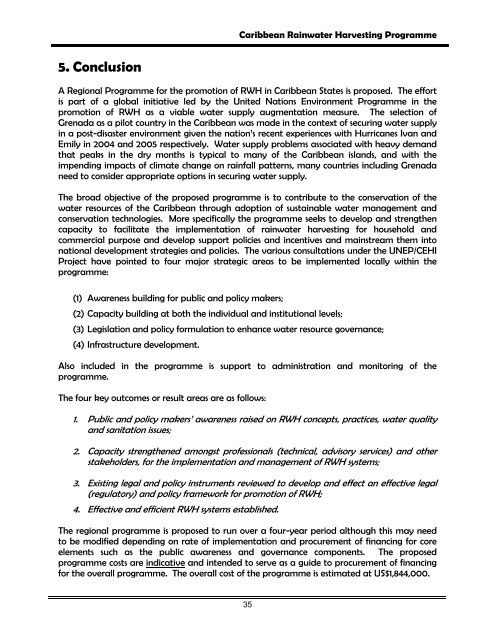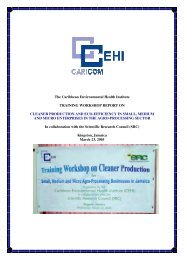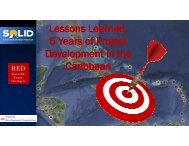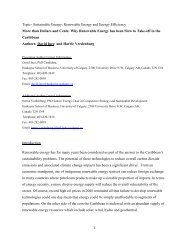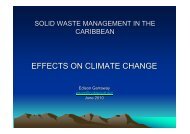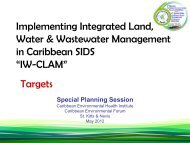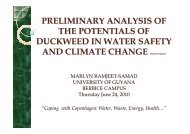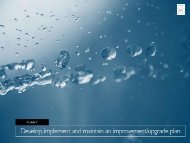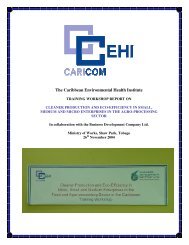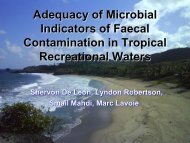A programme for Promoting Rainwater Harvesting in the Caribbean
A programme for Promoting Rainwater Harvesting in the Caribbean
A programme for Promoting Rainwater Harvesting in the Caribbean
Create successful ePaper yourself
Turn your PDF publications into a flip-book with our unique Google optimized e-Paper software.
<strong>Caribbean</strong> <strong>Ra<strong>in</strong>water</strong> <strong>Harvest<strong>in</strong>g</strong> Programme5. ConclusionA Regional Programme <strong>for</strong> <strong>the</strong> promotion of RWH <strong>in</strong> <strong>Caribbean</strong> States is proposed. The ef<strong>for</strong>tis part of a global <strong>in</strong>itiative led by <strong>the</strong> United Nations Environment Programme <strong>in</strong> <strong>the</strong>promotion of RWH as a viable water supply augmentation measure. The selection ofGrenada as a pilot country <strong>in</strong> <strong>the</strong> <strong>Caribbean</strong> was made <strong>in</strong> <strong>the</strong> context of secur<strong>in</strong>g water supply<strong>in</strong> a post-disaster environment given <strong>the</strong> nation’s recent experiences with Hurricanes Ivan andEmily <strong>in</strong> 2004 and 2005 respectively. Water supply problems associated with heavy demandthat peaks <strong>in</strong> <strong>the</strong> dry months is typical to many of <strong>the</strong> <strong>Caribbean</strong> islands, and with <strong>the</strong>impend<strong>in</strong>g impacts of climate change on ra<strong>in</strong>fall patterns, many countries <strong>in</strong>clud<strong>in</strong>g Grenadaneed to consider appropriate options <strong>in</strong> secur<strong>in</strong>g water supply.The broad objective of <strong>the</strong> proposed <strong>programme</strong> is to contribute to <strong>the</strong> conservation of <strong>the</strong>water resources of <strong>the</strong> <strong>Caribbean</strong> through adoption of susta<strong>in</strong>able water management andconservation technologies. More specifically <strong>the</strong> <strong>programme</strong> seeks to develop and streng<strong>the</strong>ncapacity to facilitate <strong>the</strong> implementation of ra<strong>in</strong>water harvest<strong>in</strong>g <strong>for</strong> household andcommercial purpose and develop support policies and <strong>in</strong>centives and ma<strong>in</strong>stream <strong>the</strong>m <strong>in</strong>tonational development strategies and policies. The various consultations under <strong>the</strong> UNEP/CEHIProject have po<strong>in</strong>ted to four major strategic areas to be implemented locally with<strong>in</strong> <strong>the</strong><strong>programme</strong>:(1) Awareness build<strong>in</strong>g <strong>for</strong> public and policy makers;(2) Capacity build<strong>in</strong>g at both <strong>the</strong> <strong>in</strong>dividual and <strong>in</strong>stitutional levels;(3) Legislation and policy <strong>for</strong>mulation to enhance water resource governance;(4) Infrastructure development.Also <strong>in</strong>cluded <strong>in</strong> <strong>the</strong> <strong>programme</strong> is support to adm<strong>in</strong>istration and monitor<strong>in</strong>g of <strong>the</strong><strong>programme</strong>.The four key outcomes or result areas are as follows:1. Public and policy makers’ awareness raised on RWH concepts, practices, water qualityand sanitation issues;2. Capacity streng<strong>the</strong>ned amongst professionals (technical, advisory services) and o<strong>the</strong>rstakeholders, <strong>for</strong> <strong>the</strong> implementation and management of RWH systems;3. Exist<strong>in</strong>g legal and policy <strong>in</strong>struments reviewed to develop and effect an effective legal(regulatory) and policy framework <strong>for</strong> promotion of RWH;4. Effective and efficient RWH systems established.The regional <strong>programme</strong> is proposed to run over a four-year period although this may needto be modified depend<strong>in</strong>g on rate of implementation and procurement of f<strong>in</strong>anc<strong>in</strong>g <strong>for</strong> coreelements such as <strong>the</strong> public awareness and governance components. The proposed<strong>programme</strong> costs are <strong>in</strong>dicative and <strong>in</strong>tended to serve as a guide to procurement of f<strong>in</strong>anc<strong>in</strong>g<strong>for</strong> <strong>the</strong> overall <strong>programme</strong>. The overall cost of <strong>the</strong> <strong>programme</strong> is estimated at US$1,844,000.35


